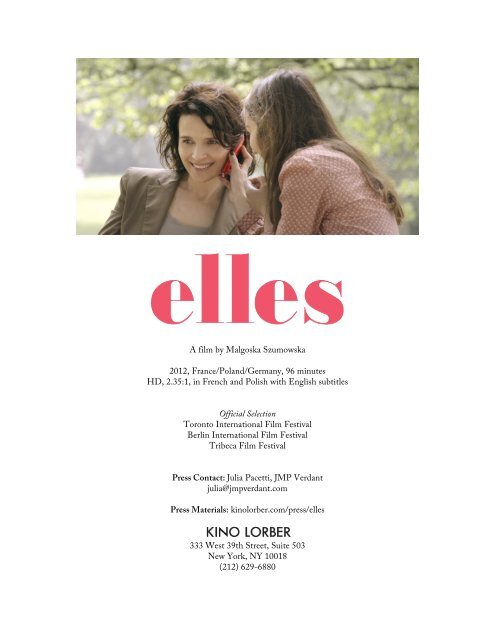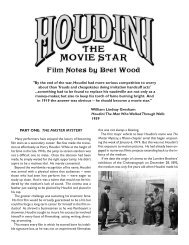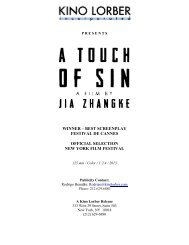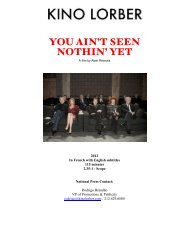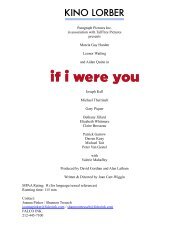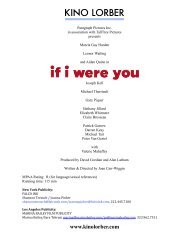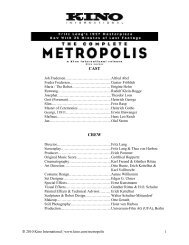Download Presskit (PDF) - Kino International
Download Presskit (PDF) - Kino International
Download Presskit (PDF) - Kino International
Create successful ePaper yourself
Turn your PDF publications into a flip-book with our unique Google optimized e-Paper software.
A film by Malgoska Szumowska<br />
2012, France/Poland/Germany, 96 minutes<br />
HD, 2.35:1, in French and Polish with English subtitles<br />
Official Selection<br />
Toronto <strong>International</strong> Film Festival<br />
Berlin <strong>International</strong> Film Festival<br />
Tribeca Film Festival<br />
Press Contact: Julia Pacetti, JMP Verdant<br />
julia@jmpverdant.com<br />
Press Materials: kinolorber.com/press/elles<br />
333 West 39th Street, Suite 503<br />
New York, NY 10018<br />
(212) 629-6880
SYNOPSIS<br />
A provocative exploration of female sexuality, Elles stars the fearless Juliette Binoche as Anne, a well-off<br />
Parisian journalist investigating the lives of two student prostitutes (Joanna Kulig and Anaïs Demoustier)<br />
for a magazine article. What begins as a routine assignment, though, quickly turns personal, as Anne is<br />
drawn into the lives of these fiercely independent young women and forced to confront her own sexual<br />
fears and desires.<br />
CAST AND CREW<br />
ANNE Juliette Binoche<br />
CHARLOTTE Anaïs Demoustier<br />
ALICJA Joanna Kulig<br />
PATRICK Louis-Do de Lencquesaing<br />
ALICJA’S MOTHER Krystyna Janda<br />
THE SADISTIC CLIENT Andrzej Chyra<br />
SAÏD Ali Marhyar<br />
ANNE’S FATHER Jean-Marie Binoche<br />
FLORENT François Civil<br />
STÉPHANE Pablo Beugnet<br />
CHARLOTTE’S MOTHER Valérie Dréville<br />
CHARLOTTE’S FATHER Jean-Louis Coulloc’h<br />
THOMAS Arthur Moncia<br />
CHARLES Scali Delpeyrat<br />
COLETTE Laurence Ragon<br />
COLETTE’S HUSBAND Alain Libolt<br />
THE YOUNG CLIENT Swann Arlaud<br />
THE GUITAR CLIENT Nicolas Layani<br />
THE BEAUTY MARK CLIENT Laurent Jumeaucourt<br />
THE CRYING CLIENT José Fumanal<br />
DIRECTED BY Malgoska Szumowska<br />
WRITTEN BY Tine Byrckel & Malgoska Szumowska<br />
PRODUCED BY Marianne Slot<br />
EXECUTIVE PRODUCED BY Olivier Guerbois<br />
DIRECTOR OF PHOTOGRAPHY Michal Englert<br />
EDITORS François Tourmen & Jacek Drosio<br />
SOUND André Rigaut<br />
CASTING Aurélie Guichard<br />
COSTUME DESIGNER Katarzyna Lewinska<br />
ART DIRECTOR Pauline Bourdon<br />
2
PRODUCED BY Slot Machine<br />
IN COPRODUCTION WITH Zentropa <strong>International</strong> Poland, Zentropa <strong>International</strong> Köln,<br />
Canal + Poland, ZDF Shot Szumowski, and Liberator Productions<br />
WITH SUPPORT FROM Polish Film Institute, Agnieszka Odorowicz, Filmstiftung NRW,<br />
Michael Schmid-Ospach, Claudia Droste-Deselaers, Martina<br />
Horbach, Deutscher Filmförderfonds, Christine Berg, Constanze<br />
Hellmich, Programme MEDIA de l'Union Européenne, La<br />
PROCIREP, l’ANGOA-AGICOA<br />
WITH THE PARTICIPATION OF Haut et Court Distribution, Memento Films <strong>International</strong>, Potemkine<br />
et Agnès b. DVD, <strong>Kino</strong>Swiat<br />
IN ASSOCIATION WITH Cofinova 7, Arte/Cofinova 6, la sofica Soficinéma 6<br />
ABOUT THE PRODUCER<br />
A French producer of Danish origin, Marianne Slot founded the independent production company Slot<br />
Machine in 1993. She has produced for Lars von Trier since 1995’s Breaking the Waves, and has also<br />
worked extensively with a number of Latin American filmmakers, including Lucrecia Martel (The<br />
Headless Woman) and Lisandro Alonso (Liverpool, Fanasma, Los Muertos).<br />
ABOUT THE DIRECTOR<br />
Malgoska Szumowska was born in 1973 in Krakow and graduated from the Lodz Film School. Her<br />
credits as director include the internationally acclaimed feature films Happy Man ('00), Stranger ('04),<br />
and 33 Scenes from Life ('08, Silver Leopard winner at Locarno), as well as a number of short<br />
documentaries and a contribution to the omnibus film Visions of Europe ('08). She has been working with<br />
the production company Zentropa since 2005, and served as a co-producer on Lars von Trier's<br />
Antichrist ('09).<br />
DIRECTOR’S STATEMENT<br />
It is a fact that young female students resort to prostitution to finance their studies. In the media, the<br />
subject is treated with moral disapproval on one hand and voyeuristic curiosity on the other. In<br />
magazines, there are ads that use women’s bodies to sell objects alongside sententious, moralizing reports<br />
about women selling their own bodies to obtain those same objects. We wanted to confront this hypocrisy<br />
through an exchange of women’s views: a female journalist in an enviable economic position, questioning<br />
two students who are trying to climb the social ladder and finance their studies through sex work — but<br />
also questioning her own desires along the way.<br />
3
INTERVIEW WITH MALGOSKA SZUMOWSKA & TINE BYRCKEL<br />
Tine, how did you come up with the idea for the film?<br />
Byrckel: The original idea came from the producer, Marianne Slot, who I’ve been working with for a long<br />
time. The media regularly talk about these young women who prostitute themselves to be able to finish<br />
their studies. This social phenomenon intrigued her. What did it mean to these young women? What did<br />
it say about society? Is prostitution the ultimate act of liberation for a woman, or is it an intolerable act of<br />
submission? We wanted to ask these questions without making any judgments, which cinema allows you<br />
to do better than any other medium.<br />
How did you end up writing the screenplay with Malgoska?<br />
Byrckel: Marianne and I were familiar with Malgoska’s work and had been completely captivated by a<br />
rough cut of her film 33 Scenes from Life. She has a unique ability to film the universe in all its tiny details.<br />
That’s how the film had to made in order to avoid any moralizing; we wanted to bring into play each<br />
protagonist’s responsibilities and desires.<br />
How did your writing process work?<br />
Byrckel: Before meeting Malgoska, I had spent time working on the story, bringing together a female<br />
journalist and several girls. There was also a structural reference to Virginia Woolf’s Mrs. Dalloway, about<br />
a day in the life of a woman who is thinking about the dinner she has to prepare later. The questioning<br />
comes from the everyday gestures and dialogue rather than being expressed through great parables. Then,<br />
with Malogska in Warsaw, we came up with about a hundred scenes, which I used to write the first<br />
versions of the screenplay.<br />
Did you do any investigation into prostitution?<br />
Byrckel: We only conducted research in the field after writing the first versions of the screenplay. In<br />
France, we asked the excellent documentary filmmaker Hélène de Crécy to go out and interview girls. She<br />
was so fascinated by their stories that she made a documentary, Escort, which was also produced by<br />
Marianne Slot.<br />
Szumowska: Before the start of the shoot, I wanted to meet some young female prostitutes. In Poland, I<br />
knew from reading the papers that many young female students are forced to sleep with the owners of the<br />
rooms they live in. The account of one young girl who was both beautiful and elegant made a great<br />
impression on me. From the start of the interview, she only talked about sex, what she did and what she<br />
liked to do.<br />
Did you get answers you weren’t expecting?<br />
4
Szumowska: To be honest, I was shocked. Shocked by the fact that a girl this pretty and intelligent<br />
derived pleasure from sleeping with men for money. And it wasn’t only to meet vital needs such as food<br />
and accommodation, but also for pleasure and to have a more pleasant life. In fact, it was very different<br />
from the fantasy that most people have of prostitution.<br />
Byrckel: We met young women who were far more proud and casual than we’d imagined. It was worlds<br />
apart from the accounts that are peddled by the media, attention-grabbing stories of young women who<br />
have been abused. We didn’t want to talk about trafficking or pimps or drugs. We wanted to talk about<br />
young women who choose to prostitute themselves, with an avowed goal of climbing the social ladder. It’s<br />
far more disturbing. There’s the issue of women as sex objects, but there’s more to it than that. On the<br />
one hand, there are men who mistake these sex acts for love. And on the other hand, women who ask<br />
for…objects! The young women we met want it all and they want it right away. They are caught in a sort<br />
of material fever.<br />
Szumowska: Another surprise was meeting a girl who was barely 20 years old and who knew more about<br />
sex than many women in their late thirties. We started to realize that the film couldn’t just be about the<br />
social aspects. We had to talk about intimacy.<br />
The film draws a parallel between the work of the journalist, a woman who has a well-established<br />
position in society, and that of female students who prostitute themselves.<br />
Szumowska: Absolutely. We do all kinds of things for money. Juliette’s character accepts a lot of<br />
compromises. In addition to her work, she spends the day preparing a meal for her husband’s boss, and<br />
she doesn’t mention her frustrations or her opinions to him. As a director, I sometimes have to do things<br />
I find unpleasant. Why is sex so different?<br />
Byrckel: Juliette’s character has difficulties keeping her distance and makes viewers aware of their own<br />
voyeuristic pleasure. We can’t keep our politically correct conscience completely intact.<br />
When did you think of Juliette for the lead role?<br />
Szumowska: I thought of Juliette right away. Her acting in Caché had impressed me so much that I<br />
couldn’t imagine any other actress for Elles. We sent her the script and as soon as we met, I knew it would<br />
work. The subject matter interested her and we shared the same approach to things. Once she said yes,<br />
she was totally committed to the film. She trusted me and always supported me, even in my moments of<br />
doubt. It was an exceptional encounter. Juliette helped me to become the director of this film.<br />
What about Anaïs Demoustier and Joanna Kulig?<br />
Szumowska: We were looking for young actresses who had the energy and liveliness I had at their age. I’d<br />
seen Anaïs in Juliette Garcias’ Sois Sage, and I was convinced by her strength and talent. As for Joanna, I<br />
recognized myself in her. Passionate, talkative, and exuberant. She wanted to be in the film so badly that<br />
5
she lied to me when I asked her if she could speak French. When I realized it wasn’t true, I thought she<br />
was very sassy. And in the end, in the film, she does speak French!<br />
Did your work with the actresses influence the film?<br />
Szumowska: It was far more than an influence. In a way, I'd say they carry the film. After each day's<br />
shooting, depending on what had been done and said, I modified the scenes we were due to shoot the<br />
next day. The actresses gave me new ideas and I arrived each morning with changes stemming from their<br />
work. I'd say that Elles is a feminine entity, influenced by all the women who worked together on the<br />
project.<br />
Once the shoot was over, was the editing a decisive stage?<br />
Szumowska: Editing is a crucial stage in my films. I made a lot of documentaries before moving on to<br />
fiction, and I kept the habit of giving great importance to the editing in the creative process. What<br />
matters to me is the accuracy in the tiny emotions conveyed by spontaneous gestures. What I'm trying to<br />
get across is, above all, the intimacy.<br />
INTERVIEW WITH JULIETTE BINOCHE<br />
What was your initial reaction when you read the screenplay?<br />
I immediately sensed the intelligence in the development of the subject matter, an approach that was both<br />
courageous and not oversimplified. The film doesn't accuse anyone, but questions us. It gives us a sense of<br />
the insidious changes in our society, which have influenced the way we are and how we think. It’s not easy<br />
to study when you have financial difficulties. Prostitution pays well, doesn't take up much time, allows a<br />
certain financial comfort, and lets you feel a part of the consumer society. We are used to advertisements<br />
in which barely pubescent girls are surrounded by luxury in provocative postures verging on the<br />
pornographic. In time, these advertisements lead you to think that youth, luxury and sex blend together<br />
quite well. Doing a casual job becomes more degrading than making love for money.<br />
How did you first meet Malgoska?<br />
Slawomir Idziak, Kieslowski's director of photography on Blue, first told me about Malgoska, and told me<br />
she was one of the most gifted Polish directors of her generation. I liked the screenplay, so I was looking<br />
forward to meeting her. She was intriguing, funny, and almost wary. The first time we saw each other,<br />
she said it would never work between us because our personalities were both too strong!<br />
Was your working relationship with her difficult?<br />
On the contrary, there was a mutual understanding and respect right from the start. I felt there was<br />
something of her in the film that needed to come out into the world. It was an artistic, emotional, and<br />
intellectual birth.<br />
6
By playing the part of the journalist who writes an article on these young women, do you become<br />
Malgoska's alter ego?<br />
It's not really about her, but about the questions she poses. What is a woman? What is her sexuality?<br />
What is love? What are her fears? What are her judgments? Prostitution? Pleasure? Youth? What excites<br />
her? What is it like to be married? To feel shame? What is it like to be stuck? Shocked? To be a mother?<br />
A journalist? The director explores all these questions through my character. I become her accomplice,<br />
her inspiration, her second wind, her sister, her researcher — even her sculpture when circumstances are<br />
ideal.<br />
Are you at a point in your career when you want to take more risks?<br />
I find risk-taking intoxicates me, stimulates me, makes me lose my bearings. It's necessary to take risks to<br />
avoid resting on your laurels and in order to open yourself up to new, pertinent experiences. Artists owe it<br />
to themselves to risk exposing their deepest self to stir their soul, to confront it with new material, new<br />
meanings, new thoughts. The real risk would be to repeat oneself, to get bogged down in certainties.<br />
Fortunately, we're not looked at for ourselves, but beyond that. And that's why I can stand that intimacy.<br />
Otherwise I'd prefer to hide — it's more comfortable! In a film, there's the idea of conveying something<br />
intimate and extraordinary that the director seeks to reveal through the actor or actress.<br />
Your character seems surprised, shocked, and amused by the girls' replies to her questions.<br />
How can you not be fascinated, intrigued, horrified, envious of the seeming freedom of youth, of this<br />
lifestyle choice, for a while? It's the question of conscience that rears its head during those interviews. The<br />
solitude of these young students and of this mother aren't so far apart at times.<br />
One also senses a burgeoning closeness between the journalist and the two girls. Did it also exist among<br />
the three actresses?<br />
Yes, but in a different way. Anaïs is a rising star of French cinema, with a remarkable ear and sensitivity.<br />
She has instinctive intelligence. What Joanna conveys is, above all, her desire for freedom, a wild side that<br />
can be expressed at any moment. We feel like she puts her whole life on the line when she acts.<br />
The idea of prostitution is extended to the whole of society.<br />
Nobody is spared. It's up to each of us to reflect on that. The film isn't judgmental, but it raises the alarm.<br />
Malgoska's idea is that the audience is excited by what they see and are caught red-handed taking part in<br />
a system. It's up to each of us to see for ourselves, and to see into ourselves.<br />
Is it inevitable to use the word "feminism" in describing the film?<br />
Talking about women, the feminine, and intimacy isn't being a feminist. To me, the word "feminism'' is<br />
inadequate, but I can understand if some people use it. Seeing a young student selling her body for money<br />
7
isn't trivial. The subject is taboo. The film doesn't try to be moralizing or assert a right. It throws light on<br />
a situation that society creates by its desire to sell, to shock, to influence, and to show the body as an<br />
object by denying a person's existence. Love in all its forms can take us to the most nightmarish situations<br />
as well as the most beautiful. True freedom is choice. It's our responsibility to make sure that this choice<br />
is safeguarded.<br />
JULIETTE BINOCHE<br />
SELECTED FILMOGRAPHY<br />
2010 Certified Copy (Abbas Kiarostami) ~ Best Actress winner, Cannes<br />
2008 Summer Hours (Olivier Assayas)<br />
Paris (Cédric Klapisch)<br />
2007 Disengagement (Amos Gitai)<br />
Flight of the Red Balloon (Hou Hsaio-hsien)<br />
2006 Breaking and Entering (Anthony Minghella)<br />
2005 Mary (Abel Ferrara)<br />
Caché (Hidden) (Michael Haneke)<br />
2003 In My Country (John Boorman)<br />
2000 Chocolat (Lasse Hallström) ~ Best Actress nominee, Academy Awards<br />
Code Unknown (Michael Haneke) ~ Best Actress nominee, César Awards<br />
1998 Alice and Martin (André Téchiné)<br />
1996 The English Patient (Anthony Minghella)~ Best Supporting Actress winner, Academy Awards<br />
1995 The Horseman on the Roof (Jean-Paul Rappeneau)<br />
1993 Blue (Krzystof Kieslowski) ~ Best Actress, César Awards<br />
1992 Damage (Louis Malle)<br />
1991 The Lovers on the Bridge (Léos Carax)<br />
1988 The Unbearable Lightness of Being (Philip Kaufman)<br />
1986 Bad Blood (Léos Carax)<br />
1985 Rendez-Vous (André Téchiné)<br />
Family Life (Jacques Doillon)<br />
Hail Mary (Jean-Luc Godard)<br />
8
ANAÏS DEMOUSTIER<br />
SELECTED FILMOGRAPHY<br />
2011 The Snows of Kilimanjaro (Robert Guediguian)<br />
The Last Winter (John Shank)<br />
2010 Living on Love Alone (Isabelle Czajka) ~ Most Promising Actress nominee, César Awards<br />
Elsewhere (Frédéric Pelle)<br />
Belle Épine (Rebecca Zlotowski)<br />
Sweet Evil (Olivier Coussemacq)<br />
2009 Sois Sage (Juliette Garcias)<br />
2008 Grown Ups (Anne Novion) ~ Most Promising Actress nominee, César Awards<br />
La Belle Personne (Christophe Honoré)<br />
Give Me Your Hand (Pascal-Alex Vincent)<br />
2006 L’Année Suivante (Isabelle Czajka)<br />
2003 The Time of the Wolf (Michael Haneke)<br />
JOANNA KULIG<br />
SELECTED FILMOGRAPHY<br />
2011 The Woman in the Fifth (Pawel Pawlikowski)<br />
Remembrance (Anna Justice)<br />
Maraton Tanca (Magdalena Lazarkiewicz)<br />
Los Numeros (Ryszard Zatorski)<br />
2010 $1,000,000 (Janusz Kondratiuk)<br />
2009 Janosik: A True Story (Agnieszka Holland & Kasia Adamik)<br />
2007 Wednesday, Thursday Morning (Grzegorz Pacek)<br />
9


